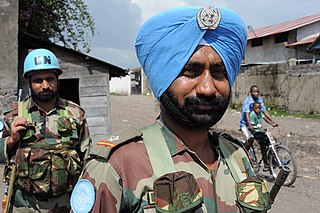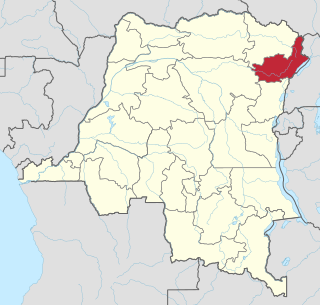| |||||
| Decades: | |||||
|---|---|---|---|---|---|
| See also: | Other events of 1997 History of the DRC 1997 in Zaire | ||||
The following lists events that happened during 1997 in the Democratic Republic of the Congo .
| |||||
| Decades: | |||||
|---|---|---|---|---|---|
| See also: | Other events of 1997 History of the DRC 1997 in Zaire | ||||
The following lists events that happened during 1997 in the Democratic Republic of the Congo .
| Date | event |
|---|---|
| 16 May | First Congo War concludes when forces under Laurent-Désiré Kabila enter Kinshasa |
| 17 May | Zaire is renamed Democratic Republic of the Congo. Bank of Zaire becomes Central Bank of the Congo |
| 27 May | Decree Law No. 3 defines a structure with a president, government, courts and tribunals. [1] |
| 29 May | Kabila announces schedule for the transition to democracy. Elections are to be held in May 1999. [1] |
| 1 July | Ismail Tutu'emoto and Bunia Luminangulu disappear. They had returned from exile to support the Alliance of Democratic Forces for the Liberation of Congo (AFDL), but had criticized Kabila, which seems to have led to their arrest. [1] |
| 28 October | Professor Kalele Ka Bila and Jean-Francois Kabanda are arrested for calling on citizens to overthrow the "Tutsi invaders". Both were supporters of the Union for Democracy and Social Progress (UDPS). [1] |

The Democratic Republic of the Congo (DRC), also known as Congo-Kinshasa, is a country in Central Africa. By land area, the DRC is the second-largest country in Africa and the 11th-largest in the world. With a population of around 112 million, the Democratic Republic of the Congo is the most populous officially Francophone country in the world. The national capital and largest city is Kinshasa, which is also the economic center. The country is bordered by the Republic of the Congo, Central African Republic, South Sudan, Uganda, Rwanda, Burundi, Tanzania, Zambia, Angola, the Cabinda exclave of Angola and the South Atlantic Ocean.

Léon Kengo wa Dondo is a Congolese politician who served as the "first state commissioner" several times under Mobutu Sese Seko in Zaïre. He was one of the most powerful figures in the regime and was a strong advocate of economic globalization and free-market economics. He served as President of the Senate of the Democratic Republic of the Congo from 2007 to 2019.

Lesbian, gay, bisexual, and transgender (LGBT) people in the Democratic Republic of the Congo (DRC) face discrimination and legal challenges not experienced by non-LGBT residents. Same-sex sexual activity is legal for both males and females in the Democratic Republic of the Congo, although LGBT individuals may still be targeted for prosecution under public indecency provisions on occasion.
DEMIAP was the military intelligence organization of the Democratic Republic of the Congo. According to Belgian official sources in 2002, it falls under the authority, 'at least officially', of the chief of staff of Congolese Armed Forces, now succeeded by the FARDC. it was divided in two departements:

The Constitution of the Democratic Republic of the Congo is the basic law governing the Democratic Republic of the Congo. The Constitution has been changed and/or replaced several times since its independence in 1960.

Article 2 of the Constitution of the Democratic Republic of the Congo divides the country into the capital city of Kinshasa and 25 named provinces. It also gives the capital the status of a province. Therefore, in many contexts Kinshasa is regarded as the 26th province.

Bundu dia Kongo, known as BDK, is a new religious movement with a political and cultural agenda that is associated with the Kongo ethnic group. It was founded in June 1969 but officially in 1986 by Ne Muanda Nsemi, who is the group's current leader, and is mainly based in the Kongo Central (Bas-Congo) province in the Democratic Republic of the Congo.

Law enforcement in the Democratic Republic of the Congo has historically been focused on furthering the state's aims with no regard for human rights. The Police nationale congolaise is the police throughout the territory of the Democratic Republic of the Congo. It was composed of between 110,000 – 150,000 officers as of 2010.

Corruption in the Democratic Republic of the Congo, which used to be an institutionalized part of the state, has been relatively lowered in recent years. However, it continues to exceed corruption in comparison to most states. The BBC's DRC country profile calls its recent history "one of civil war and corruption." President Joseph Kabila established the Commission of Repression of Economic Crimes upon his ascension to power in 2001.

Women in the Democratic Republic of the Congo have not attained a position of full equality with men, with their struggle continuing to this day. Although the Mobutu regime paid lip service to the important role of women in society, and although women enjoy some legal rights, custom and legal constraints still limit their opportunities.

The following outline is provided as an overview of and topical guide to the Democratic Republic of the Congo:

The Republic of the Congo, also known as Congo-Brazzaville, the Congo Republic or simply either Congo or the Congo, is a country located on the western coast of Central Africa to the west of the Congo River. It is bordered to the west by Gabon, to its northwest by Cameroon and its northeast by the Central African Republic, to the southeast by the Democratic Republic of the Congo, to its south by the Angolan exclave of Cabinda and to its southwest by the Atlantic Ocean.

Health problems have been a long-standing issue limiting development in the Democratic Republic of the Congo.

The Democratic Republic of the Congo, and the east of the country in particular, has been described as the "Rape Capital of the World", and the prevalence and intensity of all forms of sexual violence has been described as the worst in the world. Human Rights Watch defines sexual violence as "an act of a sexual nature by force, or by threat of force or coercion", and rape as "a form of sexual violence during which the body of a person is invaded, resulting in penetration, however slight, of any part of the body of the victim, with a sexual organ, or of the anal or genital opening of the victim with any object or other part of the body."

United Nations Security Council Resolution 1925, adopted unanimously on May 28, 2010, after reaffirming previous resolutions on the situation in the Democratic Republic of the Congo, the Council extended the mandate of the United Nations Mission in the Democratic Republic of Congo (MONUC) until June 30, 2010, authorised a withdrawal of 2,000 troops and decided that from July 1, 2010, MONUC would be known as the United Nations Organization Stabilization Mission in the Democratic Republic of the Congo (MONUSCO) with a mandate until June 30, 2011.

United Nations Security Council resolution 1279, adopted unanimously on 30 November 1999, after recalling resolutions 1234 (1999), 1258 (1999) and 1273 (1999) on situation in the Democratic Republic of the Congo, the council established the United Nations Mission in the Democratic Republic of Congo (MONUC) for an initial period until 1 March 2000.

United Nations Security Council resolution 1468, adopted unanimously on 20 March 2003, after recalling previous resolutions on the situation in the Democratic Republic of the Congo, the Council welcomed an agreement on the establishment of a transitional government and requested an increased presence of the United Nations Mission in the Democratic Republic of Congo (MONUC) in the Ituri region in the east of the country amid escalating violence.
The Democratic Republic of the Congo (DRC) is a source and destination country for men, women, and children subjected to trafficking in persons, specifically conditions of forced labor and forced prostitution. The majority of this trafficking is internal, and much of it is perpetrated by armed groups and government forces outside government control within the DRC's unstable eastern provinces.

Effacer le tableau was the operational name given to the genocide of the Bambuti pygmies by rebel forces in the Democratic Republic of the Congo (DRC).

The Republic of Angola and the Democratic Republic of the Congo share a 2,646 km border.